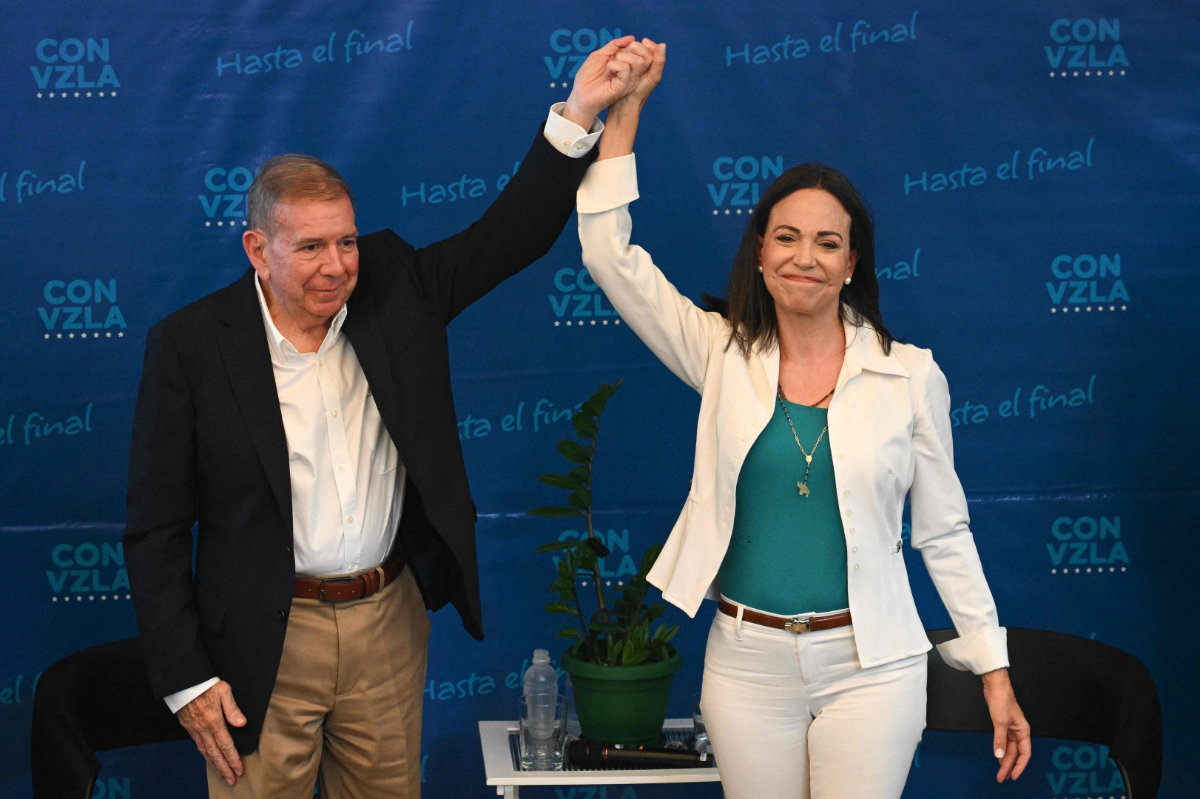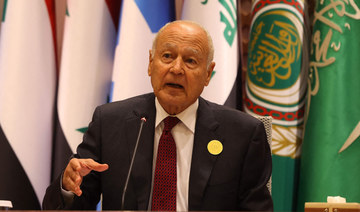NEW YORK: Columbia canceled in-person classes, dozens of protesters were arrested at Yale and the gates to Harvard Yard were closed to the public on Monday as some of the most prestigious US universities sought to diffuse campus tensions over Israel’s war with Hamas.
The various actions followed the arrest last week of more than 100 pro-Palestinian demonstrators who had camped out on Columbia’s green, as schools struggle with where to draw the line between allowing free expression while maintaining a safe and inclusive campus.
In addition to the demonstrations at the Ivy League schools, pro-Palestinian encampments have sprouted up on other campuses, including the University of Michigan, New York University, and the Massachusetts Institute of Technology.
The protests have pitted students against one another, with pro-Palestinian students demanding that their schools condemn Israel’s assault on Gaza and divest from companies that sell weapons to Israel. Some Jewish students, meanwhile, say much of the criticism of Israel has veered into antisemitism and made them feel unsafe, and point out that Hamas is still holding hostages taken during the group’s Oct. 7 invasion.
Tensions remained high Monday at Columbia in New York City, where the campus gates were locked to anyone without a school ID and where protests broke out both on campus and outside.
US Rep. Kathy Manning, a Democrat from North Carolina who was visiting Columbia with three other Jewish members of Congress to view the encampment, told reporters after meeting with students from the Jewish Law Students Association that there was “an enormous encampment of people” who had taken up about a third of the green.
“We saw signs indicating that Israel should be destroyed,” she said after leaving the Morningside Heights campus.
A woman inside the campus gates led about two-dozen protesters on the street outside in a chant of, ” From the river to the sea, Palestine will be free! ” — a charged phrase that can mean vastly different things to different groups. Meanwhile, a small group of pro-Israel counter demonstrators protested nearby.
University President Minouche Shafik said in a message to the school community Monday that she was “deeply saddened” by what was happening on campus.
“To deescalate the rancor and give us all a chance to consider next steps, I am announcing that all classes will be held virtually on Monday,” Shafik wrote, noting that faculty and staff should work remotely when possible and that students who don’t live on campus should stay away.
Protests have roiled many college campuses since Hamas’ deadly attack on southern Israel, when militants killed about 1,200 people, most of them civilians, and took roughly 250 hostages. In response, Israel has killed more than 34,000 Palestinians in the Gaza Strip, according to the local health ministry, which doesn’t distinguish between combatants and non-combatants but says at least two-thirds of the dead are children and women.
Prahlad Iyengar, an MIT graduate student studying electrical engineering, was among about two dozen students who set up a tent encampment on the school’s Cambridge, Massachusetts, campus Sunday evening. They are calling for a ceasefire and are protesting what they describe as MIT’s “complicity in the ongoing genocide in Gaza,” he said.
“MIT has not even called for a ceasefire, and that’s a demand we have for sure,” Iyengar said.
He also said MIT has been sending out confusing rules about protests.
“We’re out here to demonstrate that we reserve the right to protest. It’s an essential part of living on a college campus,” Iyengar said.
On Sunday, Elie Buechler, a rabbi for the Orthodox Union’s Jewish Learning Initiative at Columbia, sent a WhatsApp message to nearly 300 Jewish students recommending they go home until it’s more safe for them on campus.
The latest developments came ahead of the Monday evening start of the Jewish holiday of Passover.
Nicholas Baum, a 19-year-old Jewish freshman who lives in a Jewish theological seminary building two blocks from Columbia’s Morningside Heights campus, said protesters over the weekend were “calling for Hamas to blow away Tel Aviv and Israel.” He said some of the protesters shouting antisemitic slurs were not students.
“Jews are scared at Columbia. It’s as simple as that. There’s been so much vilification of Zionism, and it has spilled over into the vilification of Judaism,” he said.
The protest encampment sprung up at Columbia on Wednesday, the same day that Shafik faced bruising criticism at a congressional hearing from Republicans who said she hadn’t done enough to fight antisemitism. Two other Ivy League presidents resigned months ago following widely criticized testimony they gave to the same committee.
In her statement Monday, Shafik said the Middle East conflict is terrible and that she understands that many are experiencing deep moral distress.
“But we cannot have one group dictate terms and attempt to disrupt important milestones like graduation to advance their point of view,” Shafik wrote.
Over the coming days, a working group of deans, school administrators and faculty will try to find a resolution to the university crisis, noted Shafik, who didn’t say when in-person classes would resume.
Several students at Columbia and its sister school, Barnard College, said they were suspended for taking part in last week’s protests, including Barnard student Isra Hirsi, the daughter of Democratic US Rep. Ilhan Omar.
At Yale, police officers arrested about 45 protesters and charged them with misdemeanor trespassing, said Officer Christian Bruckhart, a New Haven police spokesperson. All were being released on promises to appear in court later, he said.
Protesters set up tents on Beinecke Plaza on Friday and demonstrated over the weekend, calling on Yale to end any investments in defense companies that do business with Israel.
Nadine Cubeisy, a Yale student and one of the protest’s organizers, said it was disturbing that “this university that I’m going to, that I contribute to and that my friends give money to is using that money to fund violence.”
In a statement to the campus community on Sunday, Yale President Peter Salovey said university officials had spoken to the student protesters multiple times about the school’s policies and guidelines, including those regarding speech and allowing access to campus spaces.
School officials said they spoke with protesters over several hours and gave them until the end of the weekend to leave Beinecke Plaza. The said they again warned protesters Monday morning and told them that they could face arrest and discipline, including suspension, before police moved in.
A large group of demonstrators regathered after Monday’s arrests at Yale and blocked a street near campus, said Bruckhart. There were no reports of any violence or injuries.
Last week, the University of Southern California took the unusual step of canceling a planned commencement speech by its 2024 valedictorian, who had publicly supported Palestinians. The university cited security concerns in a decision that was praised by some pro-Israel groups but criticized by free-speech advocates.
Pro-Palestinian protests sweep US college campuses following mass arrests at Columbia
https://arab.news/cq4rb
Pro-Palestinian protests sweep US college campuses following mass arrests at Columbia

- Columbia University canceled in-person classes and police arrested dozens of students at New York University and Yale
- Pro-Palestinian demonstrators set up encampments on other campuses around the country




























